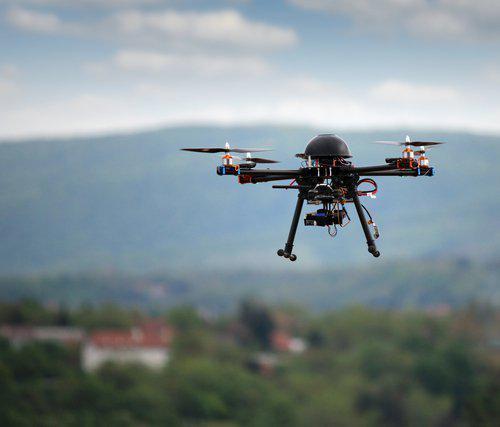Drones for Aerial Surveillance by Police
 Technology's forward progress is usually reason for celebration. New technologies can cure disease, make work easier, or improve people's quality of life. Still, new technology can also breed controversy, and one of the most controversial pieces of new technology to appear lately has been unmanned aerial vehicles, or drones. Much of the controversy has centered on drones as used by the military, but as the technology has become cheaper, local police forces have begun to invest in drones for aerial surveillance. This raises new concerns about people's privacy and their right to be protected from unreasonable searches under the Fourth Amendment.
Technology's forward progress is usually reason for celebration. New technologies can cure disease, make work easier, or improve people's quality of life. Still, new technology can also breed controversy, and one of the most controversial pieces of new technology to appear lately has been unmanned aerial vehicles, or drones. Much of the controversy has centered on drones as used by the military, but as the technology has become cheaper, local police forces have begun to invest in drones for aerial surveillance. This raises new concerns about people's privacy and their right to be protected from unreasonable searches under the Fourth Amendment.
Aerial Surveillance and the Fourth Amendment
The limits of the rights of citizens under the Fourth Amendment are often determined by cases that go before the U.S. Supreme Court. That Court has yet to hear a case about drone surveillance, but it has heard multiple cases on aerial surveillance and manned aircraft. The cases on searches by manned aircraft have tended to center on cases in which the police flew over a person's land and spotted marijuana plants from above. In response to these cases, the Supreme Court created the Flyover Exception to the Fourth Amendment. The Flyover Exception states that a person cannot have a “reasonable expectation of privacy” with regard to things that are clearly visible to anyone flying over in a plane. Without a reasonable expectation of privacy, the Fourth Amendment does not apply, so the police do not need a warrant to perform aerial surveillance.
This same argument may extend to drone searches, but it is not clear that it would. The Supreme Court has been sensitive to changes in surveillance technology in the past, and updated its doctrines to help protect people's privacy. The fact that drones make aerial surveillance so much easier and cheaper may cause the Supreme Court to change its thinking on the issue.
Wisconsin's New Law
Regardless of where the Supreme Court comes down on the ultimate limits of the Fourth Amendment, the Wisconsin legislature has already passed a law to protect its citizens. The law, 2013 Wisconsin Act 213, went into effect in April of 2014 and it requires the police to have a warrant before they use a drone to gather evidence. This protection mimics the protection that would be provided if the Fourth Amendment were extended to drone searches. However, it is important to remember that state laws are much easier to change than the Constitution, so the Supreme Court's ultimate decision on this issue may still come to matter in Wisconsin.
The law provides a variety of rights and protections to people who have been charged with a crime. If you are facing criminal charges, contact an experienced Milwaukee criminal defense attorney today to learn more about what those rights are.






